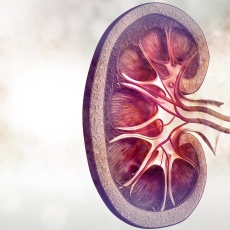
You have two kidneys, each about the size of your fist. They are near the middle of your back, just below the rib cage. Inside each kidney there are about a million tiny structures called nephrons. They filter your blood. They remove wastes and extra water, which become urine. The urine flows through tubes called ureters. It goes to your bladder, which stores the urine until you go to the bathroom.
Most kidney diseases attack the nephrons. This damage may leave kidneys unable to remove wastes. Causes can include genetic problems, injuries, or medicines. You have a higher risk of kidney disease if you have diabetes, high blood pressure, or a close family member with kidney disease. Chronic kidney disease damages the nephrons slowly over several years. Other kidney problems include:
- Kidney Diseases (National Library of Medicine)You have two kidneys, each about the size of your fist. They are near the middle of your back, just below the rib cage. Inside each kidney there are about a million tiny structures called ...
- Kidney Tests (National Library of Medicine)You have two kidneys. They are fist-sized organs on either side of your backbone above your waist. Your kidneys filter and clean your blood, taking out waste ...
- Kidney Cysts (National Library of Medicine)... a fluid-filled sac. You may get simple kidney cysts as you age; they are usually harmless. There are also some diseases which cause kidney cysts. One type is polycystic kidney disease (PKD). ...
- Chronic Kidney Disease (National Library of Medicine)You have two kidneys, each about the size of your fist. Their main job is to filter your blood. They remove wastes and ... help control blood pressure, and make hormones. Chronic kidney disease (CKD) means that your kidneys are damaged ...
- Diabetic Kidney Problems (National Library of Medicine)... too high. Over time, this can damage your kidneys. Your kidneys clean your blood. If they are damaged, waste ... in your blood instead of leaving your body. Kidney damage from diabetes is called diabetic nephropathy. It ...
- Kidney Failure (National Library of Medicine)Healthy kidneys clean your blood by removing excess fluid, minerals, and wastes. They also make hormones that keep your ... strong and your blood healthy. But if the kidneys are damaged, they don't work properly. Harmful ...
- Kidney Cancer (National Library of Medicine)You have two kidneys. They are fist-sized organs on either side of your backbone above your waist. The tubes inside filter and ... blood, taking out waste products and making urine. Kidney cancer forms in the lining of tiny tubes ...
- Kidney Stones (National Library of Medicine)A kidney stone is a solid piece of material that forms in the kidney from substances in the urine. It may be ... sand or as large as a pearl. Most kidney stones pass out of the body without help ...
- Kidney Transplantation (National Library of Medicine)A kidney transplant is an operation that places a healthy kidney in your body. The transplanted kidney takes over the work of the two kidneys that failed, so you no longer need dialysis. ...
- Kidney Stone Analysis What is a kidney stone analysis? Kidney stones are small, pebble-like pieces of material that form in one or both of your kidneys. Your kidneys ... get another one. Why do I need a kidney stone analysis? You may need a kidney stone ... vomiting Fever and chills What happens during a kidney stone analysis? To collect a kidney stone, you ...



